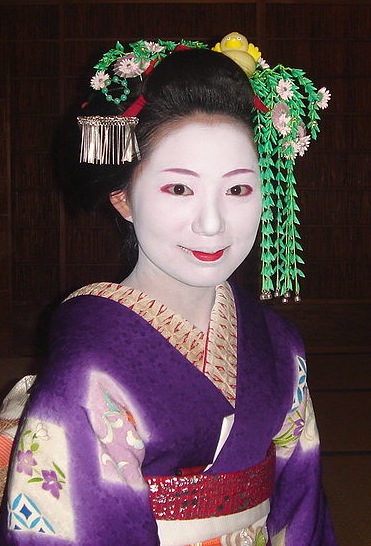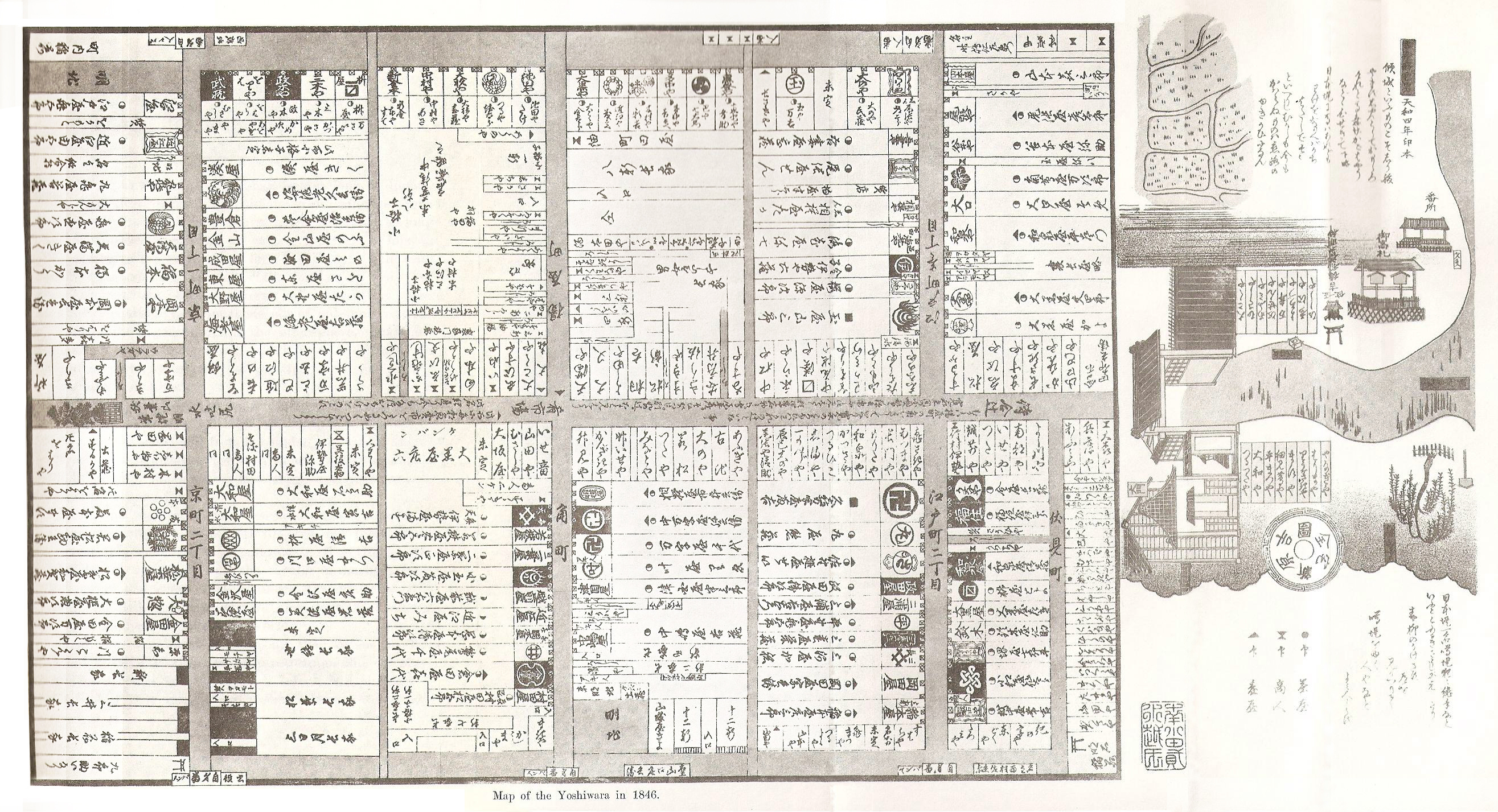|
Mizu Shōbai
, literally the water trade, is the euphemism for jobs that do not provide a contractually fixed salary, but instead rely on the popularity of the performer among their fans or clientele. Broadly, it includes the television, theater and movie industries, but more narrowly, it can refer to those who work in businesses that serve alcohol or sex work. Bars, cabarets, health, hostess bars, image clubs, pink salons and soaplands are all part of the ; though they are not sex workers, geisha and kabuki actors are traditionally considered part of the as well. Etymology While the actual origin of the term is debatable, it is likely the term came into use during the Tokugawa shogunate (1603–1868). The Tokugawa period saw the development of large bathhouses and an expansive network of roadside inns offering "hot baths and sexual release", as well as the expansion of geisha districts and courtesan quarters in cities and towns throughout the country. Bearing relation to the ... [...More Info...] [...Related Items...] OR: [Wikipedia] [Google] [Baidu] |
Euphemism
A euphemism () is an innocuous word or expression used in place of one that is deemed offensive or suggests something unpleasant. Some euphemisms are intended to amuse, while others use bland, inoffensive terms for concepts that the user wishes to downplay. Euphemisms may be used to mask profanity or refer to topics some consider taboo such as disability, sex, excretion, or death in a polite way. Etymology ''Euphemism'' comes from the Greek word () which refers to the use of 'words of good omen'; it is a compound of (), meaning 'good, well', and (), meaning 'prophetic speech; rumour, talk'. '' Eupheme'' is a reference to the female Greek spirit of words of praise and positivity, etc. The term ''euphemism'' itself was used as a euphemism by the ancient Greeks; with the meaning "to keep a holy silence" (speaking well by not speaking at all). Purpose Avoidance Reasons for using euphemisms vary by context and intent. Commonly, euphemisms are used to avoid directly addressing sub ... [...More Info...] [...Related Items...] OR: [Wikipedia] [Google] [Baidu] |
Japanese Sex Terms
Japanese may refer to: * Something from or related to Japan, an island country in East Asia * Japanese language, spoken mainly in Japan * Japanese people, the ethnic group that identifies with Japan through ancestry or culture ** Japanese diaspora, Japanese emigrants and their descendants around the world * Japanese citizens, nationals of Japan under Japanese nationality law ** Foreign-born Japanese, naturalized citizens of Japan * Japanese writing system, consisting of kanji and kana * Japanese cuisine, the food and food culture of Japan See also * List of Japanese people * * Japonica (other) * Japonicum * Japonicus * Japanese studies Japanese studies ( Japanese: ) or Japan studies (sometimes Japanology in Europe), is a sub-field of area studies or East Asian studies involved in social sciences and humanities research on Japan. It incorporates fields such as the study of Japane ... {{disambiguation Language and nationality disambiguation pages ... [...More Info...] [...Related Items...] OR: [Wikipedia] [Google] [Baidu] |
Businesses Affecting Public Morals Regulation Act
The , also known as or , is a law that regulates entertainment places in Japan. History * 1948: Creation of the law. * April 1, 1959: Name change. * August 14, 1984: Extension to some businesses before midnight. * April 1998: Extension to some massage businesses and adult videos transmission by Internet. * November 2005: Penal regulation enforcement, various new rules. * January 2015: Proposition to relax the law is rejected. *Effective 2016 the law will be relaxed, allowing permits for exceptions as long as certain conditions are met including lighting and not operating near residential areas. Targets Businesses offering food and entertainment * Category 1: Japanese cabaret. * Category 2: Kyabakura (hostess bar). * Category 3: Business where customers can eat and dance. * Category 4: Dance hall. ** At first this covered dance schools too. Dance schools were removed from this category in 1998 after the movie Shall We Dance? made ballroom dance popular. * Category 5: Bar ... [...More Info...] [...Related Items...] OR: [Wikipedia] [Google] [Baidu] |
Sexuality In Japan
Sexuality in Japan developed separately from that of mainland Asia, as Japan did not adopt the Confucian view of marriage, in which chastity is highly valued. Monogamy in marriage is often thought to be less important in Japan, and sometimes married men may seek pleasure from courtesans. Prostitution in Japan has a long history, and became especially popular during the Japanese economic miracle, as evening entertainments were tax-deductible. Decreased sex drive in the 21st century has been blamed for the low Japanese birth rate and declining growth of the Japanese population. Pornography Arguably mass-produced pornography in Japan may have begun as early as the Edo period (1603–1868), as erotic artwork referred to as '' shunga'' that was typically produced with woodblock prints in the 1,000’s. These erotic images were declared obscene and banned in 1772 by the Tokugawa shogunate, although they continued to be produced underground in smaller numbers. Between the 1920s a ... [...More Info...] [...Related Items...] OR: [Wikipedia] [Google] [Baidu] |
Prostitution In Japan
Prostitution in Japan has existed throughout the country's history. While the Prostitution Prevention Law of 1956 states that "No person may either do prostitution or become the customer of it", loopholes, liberal interpretations and a loose enforcement of the law have allowed the Japanese sex industry to prosper and earn an estimated 2.3 trillion yen ($24 billion) per year. Sex trade and sex services may be referred to as , which also means "manners", "customs" or "public morals". Since Japanese law defines prostitution as "intercourse with an unspecified person in exchange for payment", most services offer specifically non-coital services, such as conversation, dancing or bathing, sometimes accompanied by sexual acts that legally are not defined as "intercourse", in order to remain legal. History From the 15th century, Chinese, Koreans, and other East Asian visitors frequented brothels in Japan. This practice later continued among visitors from "the Western region ... [...More Info...] [...Related Items...] OR: [Wikipedia] [Google] [Baidu] |
Host And Hostess Clubs
A hostess club is a type of night club found primarily in Japan. They employ primarily female staff and cater to men seeking drinks and attentive conversation. The modern host club is a similar type of establishment where primarily male staff attend to women. Host and hostess clubs are considered part of '' mizu shōbai'' (literally "water trade"), the night-time entertainment business in Japan. Hostess clubs Japan In Japan, two types of bars are hostess clubs: , a portmanteau of ; and . Kyabakura hostesses are known as (''cabaret girl''), and many use professional names, called . They light cigarettes, provide beverages for men, offer flirtatious conversation, and sing karaoke to entertain customers. They can be seen as the modern counterpart of geishas, providing entertainment to groups of salarymen after work. The clubs also often employ a female bartender usually well-trained in mixology, and who may also be the manager or '' mamasan''. Hostess clubs are distinguished ... [...More Info...] [...Related Items...] OR: [Wikipedia] [Google] [Baidu] |
Kyabakura Union
A hostess club is a type of night club found primarily in Japan. They employ primarily female staff and cater to men seeking drinks and attentive conversation. The modern host club is a similar type of establishment where primarily male staff attend to women. Host and hostess clubs are considered part of ''mizu shōbai'' (literally "water trade"), the night-time entertainment business in Japan. Hostess clubs Japan In Japan, two types of bars are hostess clubs: , a portmanteau of ; and . Kyabakura hostesses are known as (''cabaret girl''), and many use professional names, called . They light cigarettes, provide beverages for men, offer flirtatious conversation, and sing karaoke to entertain customers. They can be seen as the modern counterpart of geishas, providing entertainment to groups of salarymen after work. The clubs also often employ a female bartender usually well-trained in mixology, and who may also be the manager or '' mamasan''. Hostess clubs are distinguished from ... [...More Info...] [...Related Items...] OR: [Wikipedia] [Google] [Baidu] |
Teahouse
A teahouse (mainly Asia) or tearoom (also tea room) is an establishment which primarily serves tea and other light refreshments. A tea room may be a room set aside in a hotel especially for serving afternoon tea, or may be an establishment which only serves cream teas. Although the function of a tearoom may vary according to the circumstance or country, teahouses often serve as centers of social interaction, like coffeehouses. Some cultures have a variety of distinct tea-centered establishments of different types, depending on the national tea culture. For example, the British or American tearoom serves afternoon tea with a variety of small snacks. Asia In China, Japan and Nepal, a teahouse ( Chinese: , or , ; Japanese: ; Standard Nepali: ) is traditionally a place which offers tea to its customers. People gather at teahouses to chat, socialize and enjoy tea, and young people often meet at teahouses for dates. The Guangdong (Cantonese) style teahouse is particularly ... [...More Info...] [...Related Items...] OR: [Wikipedia] [Google] [Baidu] |
Red-light District
A red-light district or pleasure district is a part of an urban area where a concentration of prostitution and sex-oriented businesses, such as sex shops, strip clubs, and adult theaters, are found. In most cases, red-light districts are particularly associated with female street prostitution, though in some cities, these areas may coincide with spaces of male prostitution and gay venues. Areas in many big cities around the world have acquired an international reputation as red-light districts. The term ''red-light district'' originates from the red lights that were used as signs for brothels. Origins of term Red-light districts are mentioned in the 1882 minutes of a Woman's Christian Temperance Union meeting in the United States. The ''Oxford English Dictionary'' records the earliest known appearance of the term "red light district" in print as an 1894 article from the '' Sandusky Register'', a newspaper in Sandusky, Ohio. Author Paul Wellman suggests that this and other te ... [...More Info...] [...Related Items...] OR: [Wikipedia] [Google] [Baidu] |
Metaphor
A metaphor is a figure of speech that, for rhetorical effect, directly refers to one thing by mentioning another. It may provide (or obscure) clarity or identify hidden similarities between two different ideas. Metaphors are often compared with other types of figurative language, such as antithesis, hyperbole, metonymy, and simile. One of the most commonly cited examples of a metaphor in English literature comes from the " All the world's a stage" monologue from '' As You Like It'': All the world's a stage, And all the men and women merely players; They have their exits and their entrances And one man in his time plays many parts, His Acts being seven ages. At first, the infant... :—William Shakespeare, '' As You Like It'', 2/7 This quotation expresses a metaphor because the world is not literally a stage, and most humans are not literally actors and actresses playing roles. By asserting that the world is a stage, Shakespeare uses points of comparison between the world a ... [...More Info...] [...Related Items...] OR: [Wikipedia] [Google] [Baidu] |





